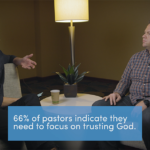
Do you ever blame God for any of these four mistakes? Spiritualizing failures can be a professional blind spot for pastors.
By Mark Dance
Have you ever spiritualized a mistake or even a sin? Spiritualizing failures can be a professional blind spot for pastors because of our predisposition toward the supernatural. This post is not intended to discourage you from seeing the hand of God in your ministry. Rather, it is a reminder that we can easily confuse the hand of God with the hand of man.
I want to propose a handful of examples of how ministers have misappropriated blame on God for their own mistakes.
1. Preaching too long
I’ll start with the most obvious infraction. Whether a preacher has formal or informal time expectations for the sermon, there is always an expectation in the U.S. When I am a guest speaker, I ask these three questions: How long do you want me to preach? How formal do you want me to dress? May I use the CSB translation? My goal is to preach in less time than they give me, which always surprises them.
I personally use an app called “Visual Task Timer.” Wherever I speak, I set the timer on my phone (in airplane mode) and set it next to my Bible and iPad. I keep it on silent mode as it counts down to whatever time I set it on. It even has a “Low Time Warning” which turns the countdown clock to red in the last seven minutes.
“Pastor, we should never blame God for losing track of time in our sermons.” — @markdance Click To TweetPastor, we should never blame God for losing track of time in our sermons. Why should the preacher be the only person in the room who does not know what time it is? The same applies to worship pastors who love to over-introduce every song with a micro-sermon. I love including the testimonies of lay people in worship. However, I prefer to capture them on video because they so easily lose track of their thoughts and time, which can be embarrassingly awkward for everyone.
2. Being late for appointments
Constantly showing up late to meetings and appointments may be considered a sister sin to preaching or singing too long, because both inadvertently communicate disrespect. There is no scenario by which you can always be on time, because you cannot control traffic accidents or real emergency situations. However, if you are perpetually showing up late, you are demonstrating a lack of discipline and respect, which will erode trust over time—especially if you blame it on God. If there is always a “donkey in the ditch,” you are the donkey!
Worse than showing up late is not showing up at all. I cannot conceive of a legitimate excuse for being a no-show in the 21st century unless you belong to the 15% of Americans who do not own a smartphone. Only 7% of college graduates do not have one. I think we can all agree technology is both a blessing and a curse to pastors, but when it comes to time management, we have no real excuses off stage or on stage, because every time management tool we could ever imagine is already on our phones.
3. Acting in anger
Two of the angriest offenders in the Bible were named Saul—both of whom blamed God for their actions.
King Saul justified his famous tantrums and murderous plots by suggesting that it was a matter of national security to protect Israel from David. Saul used his God-card when he got impatient, like when he determined that Samuel was taking too long to get to the battlefield and decided to take things into his own hands (1 Samuel 13) or when he hastily jeopardized his son’s life with a vow made in anger (1 Samuel 14:24-46).
“Only God could redeem and restore Saul, and He can do the same for you if anger has a stronghold on your life and ministry.” — @markdance Click To TweetLikewise, Saul of Tarsus used the God-card to justify his homicidal tendencies. Nobody could win an argument against Saul because of his illustrious education, persuasive speech, and endless zeal. Pastors generally have those same cards to play when trying to convince people to follow their visions.
So, we should all take heed from both the insecure King Saul and the overly secure Saul of Tarsus who used their God-cards to get their way. The primary difference between these Sauls was repentance. King Saul rejected multiple opportunities to repent, choosing instead to dig in even further. Saul of Tarsus, on the other hand, chose to repent and reject the darkness in his heart in his temporary state of blindness. Only God could redeem and restore Saul, and He can do the same for you if anger has a stronghold on your life and ministry.
Be angry and do not sin.
Psalm 4:4, CSB
4. Being unprepared
Very early in my pastoral ministry, a local pastor justified his lack of sermon preparation by saying, “I’d rather depend on inspiration than preparation.” I remember thinking, “Why do we have to choose between inspiration and preparation?”
Preach the word; be ready in season and out of season…
2 Timothy 4:2, CSB
Preachers and Boy Scouts are not the only ones who need to be prepared. Peter challenges believers to be “ready at any time to give a defense to anyone who asks you for a reason for the hope that is in you” (1 Peter 3:15, CSB).
“Instead of spiritualizing your mistakes (blaming God), own it, learn from it, and make whatever changes you can.” — @markdance Click To TweetThere will inevitably be situations where personal or ministry emergencies divert our original plans. Whether we have a message to bring, a meeting to lead, or a deadline to meet, we all get behind at times. It is at that point where we either fake it or face it. Instead of spiritualizing the situation (blaming God), own it, learn from it, and make whatever changes you can. Then give yourself some of the grace you preached about last week.
For permission to republish this article, contact Marissa Postell Sullivan.

Mark Dance
After serving as a pastor for 27 years, Mark Dance is now the director of pastoral wellness for GuideStone Financial Resources and is the author of Start to Finish.












